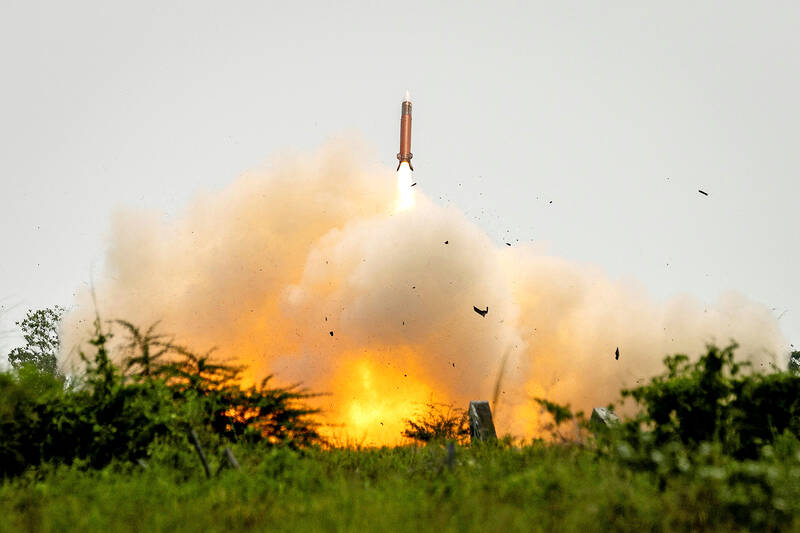The military last month participated in live-fire launches of MM-104F Patriot (PAC-3) missiles under US observation in an undisclosed location in Palau, a step forward in a US-led plan to create a joint defense missile system in the first island chain, a source said on condition of anonymity.
The PAC-3 is the mainstay surface-to-air missile of the US, NATO and democratic nations in East Asia, the source said, adding that it has never been live-tested within Taiwan’s borders, the source said.
The proximity of Taiwan to China and China’s close surveillance of the nation’s borders and nearby sea zones is a significant reason for the lack of tests near Taiwan, the source said.

Photo: Reuters
Japan faces similar restrictions, the source added.
Most tests involving PAC-3 missiles are conducted in the White Sands Missile Range in New Mexico, they said.
The US is creating a joint missile defense network in the first island chain and for the past few years has been conducting live-fire PAC-3 missile exercises on islands in the Pacific Ocean bordering the East Asia region, the source said.
The exercises in Palau and elsewhere include missile forces from third nations alongside US troops stationed in Japan and elsewhere, they said.
US military officials stationed in Japan on July 17 stated that missile exercises were to be held in Palau, the source said.
The exercises were based at Roman Temtuchl International Airport on Palau’s main island and conducted by the US Army’s 38th Air Defense Artillery Brigade, which is stationed at Sagame General Depot in Sagamihara, Japan, they said.
The brigade successfully used the PAC-3s to intercept drones during the exercise, the second conducted in Palau by the 38th Brigade, the source said.
The brigade observed as exercises involving Taiwanese military personnel were conducted last month, they said.
Taiwan transported missile corps to Palau using C-130 Hercules, while the PAC-3 systems they used were brought in from Taiwan or were equipment Taiwanese forces had trained on in the US, they said.
The military had not commented on the report as of press time last night.

DAREDEVIL: Honnold said it had always been a dream of his to climb Taipei 101, while a Netflix producer said the skyscraper was ‘a real icon of this country’ US climber Alex Honnold yesterday took on Taiwan’s tallest building, becoming the first person to scale Taipei 101 without a rope, harness or safety net. Hundreds of spectators gathered at the base of the 101-story skyscraper to watch Honnold, 40, embark on his daredevil feat, which was also broadcast live on Netflix. Dressed in a red T-shirt and yellow custom-made climbing shoes, Honnold swiftly moved up the southeast face of the glass and steel building. At one point, he stepped onto a platform midway up to wave down at fans and onlookers who were taking photos. People watching from inside

A Vietnamese migrant worker yesterday won NT$12 million (US$379,627) on a Lunar New Year scratch card in Kaohsiung as part of Taiwan Lottery Co’s (台灣彩券) “NT$12 Million Grand Fortune” (1200萬大吉利) game. The man was the first top-prize winner of the new game launched on Jan. 6 to mark the Lunar New Year. Three Vietnamese migrant workers visited a Taiwan Lottery shop on Xinyue Street in Kaohsiung’s Gangshan District (崗山), a store representative said. The player bought multiple tickets and, after winning nothing, held the final lottery ticket in one hand and rubbed the store’s statue of the Maitreya Buddha’s belly with the other,

Japan’s strategic alliance with the US would collapse if Tokyo were to turn away from a conflict in Taiwan, Japanese Prime Minister Sanae Takaichi said yesterday, but distanced herself from previous comments that suggested a possible military response in such an event. Takaichi expressed her latest views on a nationally broadcast TV program late on Monday, where an opposition party leader criticized her for igniting tensions with China with the earlier remarks. Ties between Japan and China have sunk to the worst level in years after Takaichi said in November that a hypothetical Chinese attack on Taiwan could bring about a Japanese

‘COMMITTED TO DETERRENCE’: Washington would stand by its allies, but it can only help as much as countries help themselves, Raymond Greene said The US is committed to deterrence in the first island chain, but it should not bear the burden alone, as “freedom is not free,” American Institute in Taiwan Director Raymond Greene said in a speech at the Institute for National Defense and Security Research’s “Strengthening Resilience: Defense as the Engine of Development” seminar in Taipei yesterday. In the speech, titled “Investing Together and a Secure and Prosperous Future,” Greene highlighted the contributions of US President Donald Trump’s administration to Taiwan’s defense efforts, including the establishment of supply chains for drones and autonomous systems, offers of security assistance and the expansion of